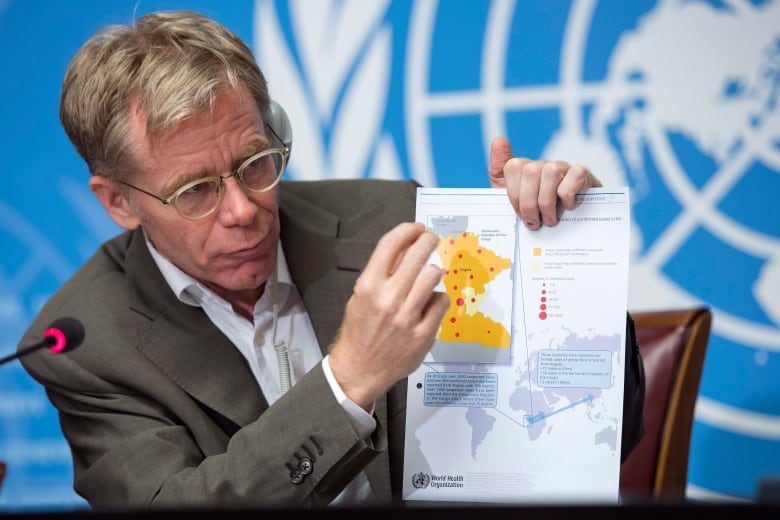
This article is more than
6 year old
The latest:
The illness caused by the coronavirus that has triggered an international outbreak and killed more than 1,000 people has been given a new name.
The World Health Organization (WHO) said Tuesday its group of virologists in charge of naming infectious diseases has dubbed the illness COVID-19. The short form stands for coronavirus disease, and the number 19 refers to the year of its origin — 2019.
WHO Director General Tedros Adhanom Ghebreyesus said it had to find a name that did not create stigma by referring to a geographical location, an animal or group of people.
The organization reported on Tuesday that 1,017 people had died from the illness in China, where there were 42,708 cases.
Only 319 cases have been confirmed in 24 other countries and territories outside mainland China, with one death in the Philippines.

Canada has seven confirmed cases of the illness, four in British Columbia and three in Ontario.
For context, influenza claims between 290,000 to 650,000 lives annually, and three to five million people experience severe cases of the illness.
Asked about recent cases where the disease incubation period was reported to be up to 24 days, Dr. Theresa Tam, Canada's Chief Public Health Officer, said the longest is usually 14 days, but there are "outliers."

A second Canadian plane carrying evacuees from the quarantined region of China's Hubei province landed Tuesday morning at Canadian Forces Base Trenton in southern Ontario.
Foreign Affairs Minister François-Philippe Champagne said the plane landed with 130 Canadians and 58 accompanying family members.
Officials say all the passengers were screened and have exhibited no symptoms of the virus.
They'll be placed under quarantine at CFB Trenton with the 213 Canadians and family members who arrived from Wuhan last week.
The flight crew has been examined, and Canada's chief public health officer, Dr. Theresa Tam, decided all 25 of them can be safely released from quarantine because they did not spend time in the centre of the outbreak and they followed appropriate infection prevention and control protocols.
This latest flight was the last one planned to carry Canadians out of the part of China where the virus was first detected.
The government continues to encourage any Canadians in China whose presence there is non-essential to consider leaving the country while commercial flights are available.
Zhong Nanshan, China's foremost medical adviser on the outbreak who played a key role in combating an outbreak of severe acute respiratory syndrome in 2003, said Tuesday he expected the outbreak to peak later this month.
"I hope this outbreak, or this event, may be over in something like April," he said.
But in a meeting with reporters, WHO officials warned against complacency about the outbreak.
The world must "wake up and consider this enemy virus as public enemy No. 1," WHO chief Tedros Adhanom Ghebreyesus told reporters.
He said the first vaccine is 18 months away.
"A virus can have more powerful consequences than any terrorist action."
Meanwhile, renowned Canadian epidemiologist Bruce Aylward made his way to China to lead a team of WHO experts to study the origin of the virus and its severity.
Aylward previously led reforms of WHO's emergency preparedness program.
Canada has agreed to provide $2 million to the World Health Organization to help vulnerable countries prepare for a potential coronavirus outbreak beyond China.
Additionally, the Canadian Institutes of Health Research (CIHR) has put out a call for proposals to scientists interested in launching quick studies of the coronavirus if it breaks out here in Canada.
High-tech companies in Canada and around the world, for example, are eyeing their supply chains as experts warn the repercussions of the outbreak for Chinese manufacturing plants are starting to be felt.
The quarantine in Hubei province has created a cloud of uncertainty over the country's manufacturing sector, which supplies goods the world over.
The outbreak struck during the Lunar New Year, a time when factories ordinarily close for the holiday, but many have yet to reopen.
Even the NHL could feel an impact. Custom hockey sticks used by about three-quarters of NHLers are made only at two factories located in the part of China most affected by the disease.
Compounding the overall problem is ongoing travel restrictions that are keeping employees from getting to work in plants in China and surrounding countries.
Chinese President Xi Jinping, head of the ruling Communist Party, made a rare public appearance that aired on state television Tuesday. He was shown wearing a surgical mask and having his temperature taken before expressing his thanks to health workers on behalf of the party and government.
"We will most definitely win this people's war," he said.
Xi has come under some criticism for his handling of the outbreak, particularly the failure of local officials in the worst-hit city of Wuhan to clarify the extent of the crisis.
Public anger has been inflamed over the death of a young doctor from the virus who had earlier been threatened by police, along with seven others, for warning online of the potential for a major outbreak as early as December.
With files from The Canadian Press, The Associated Press, Reuters and CBC's Pete Evans